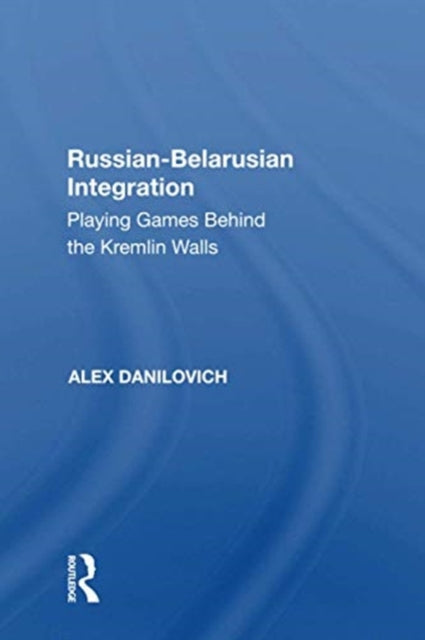Alex Danilovich
Russian-Belarusian Integration: Playing Games Behind the Kremlin Walls
Russian-Belarusian Integration: Playing Games Behind the Kremlin Walls
YOU SAVE £1.15
- Condition: Brand new
- UK Delivery times: Usually arrives within 2 - 3 working days
- UK Shipping: Fee starts at £2.39. Subject to product weight & dimension
Bulk ordering. Want 15 or more copies? Get a personalised quote and bigger discounts. Learn more about bulk orders.
Couldn't load pickup availability
- More about Russian-Belarusian Integration: Playing Games Behind the Kremlin Walls
Russian domestic politics and foreign policy are complex and dynamic, with Russia refusing to take back a portion of its former empire despite offers of a bridge to Europe and a geostrategic position. Alex Danilovich clarifies this paradox by linking Russia's foreign policy to its domestic politics and explaining why specific attempts to reunify Russia and Belarus failed.
\n Format: Paperback / softback
\n Length: 250 pages
\n Publication date: 18 December 2020
\n Publisher: Taylor & Francis Ltd
\n
Russian domestic politics have long been characterized by a complex and pragmatic nature, exhibiting both intricate intricacies and breathtaking dynamism. This complexity extends to Russia's foreign policy, particularly in its relations with former Soviet republics. Any examination of Russian foreign policy inevitably leads to the intriguing question of why Russia, traditionally perceived as an enduring imperial power, would decline to reclaim a significant portion of its former empire, which holds the potential to provide a gateway to Europe and a strategically advantageous geostrategic position. Despite official declarations, Russia has made limited progress in achieving unity with its ex-Soviet neighbor, Belarus.
To elucidate this paradox and provide an explanation for the unsuccessful attempts to reunify Russia and Belarus, Alex Danilovich delves into the interconnectedness of Russia's foreign policy with its domestic politics. He highlights the specific factors that contributed to these failures, despite the desires of significant forces on both sides and in alignment with certain theoretical expectations.
In the context of Russian domestic politics, Danilovich emphasizes the role of the state and its institutions in shaping foreign policy decisions. He notes that the Russian government has often prioritized the interests of its own citizens and the preservation of its power and influence over external alliances and commitments. This domestic focus has sometimes led to conflicts with neighboring countries and the reluctance to relinquish control over territories or resources that hold strategic value.
Furthermore, Danilovich explores the influence of political elites and interest groups on Russian foreign policy. He argues that these groups, with their own agendas and priorities, have played a significant role in shaping Russia's approach to its ex-Soviet neighbors and other international actors. The interests of these groups may diverge from the broader national interests, leading to policy decisions that prioritize short-term gains over long-term stability and cooperation.
The historical context of Russia's relations with its former Soviet republics is also examined by Danilovich. He highlights the legacy of Soviet-era policies, including the division of territories and the establishment of authoritarian regimes, which have contributed to the current challenges in achieving unity and stability in the region. The lingering effects of these policies have made it difficult for Russia to establish strong and lasting relationships with its neighbors, particularly those that have sought to assert their independence and autonomy.
In conclusion, Russian domestic politics and foreign policy are intricately intertwined, with each influencing and shaping the other. The complex and pragmatic nature of Russian politics has contributed to the country's reluctance to reclaim its former empire and its challenges in achieving unity with its ex-Soviet neighbors. The influence of political elites, interest groups, and historical legacies have played a significant role in shaping Russia's foreign policy decisions, often at the expense of long-term stability and cooperation. Understanding these dynamics is crucial for comprehending Russia's role in global affairs and its interactions with its neighbors.
\n Weight: 463g\n
Dimension: 234 x 156 (mm)\n
ISBN-13: 9781138620476\n \n
This item can be found in:
UK and International shipping information
UK and International shipping information
UK Delivery and returns information:
- Delivery within 2 - 3 days when ordering in the UK.
- Shipping fee for UK customers from £2.39. Fully tracked shipping service available.
- Returns policy: Return within 30 days of receipt for full refund.
International deliveries:
Shulph Ink now ships to Australia, Belgium, Canada, France, Germany, Ireland, Italy, India, Luxembourg Saudi Arabia, Singapore, Spain, Netherlands, New Zealand, United Arab Emirates, United States of America.
- Delivery times: within 5 - 10 days for international orders.
- Shipping fee: charges vary for overseas orders. Only tracked services are available for most international orders. Some countries have untracked shipping options.
- Customs charges: If ordering to addresses outside the United Kingdom, you may or may not incur additional customs and duties fees during local delivery.


